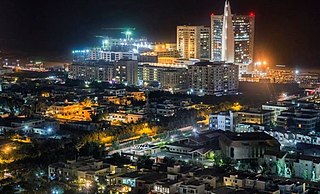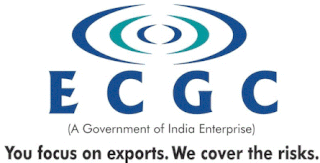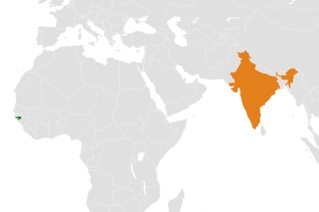
The economy of Pakistan is the 23rd largest in the world in terms of purchasing power parity (PPP), and 42nd largest in terms of nominal gross domestic product. Pakistan has a population of over 220 million, giving it a nominal GDP per capita of $1,357 in 2019, which ranks 154th in the world and giving it a PPP GDP per capita of 5,839 in 2019, which ranks 132nd in the world for 2019. However, Pakistan's undocumented economy is estimated to be 36% of its overall economy, which is not taken into consideration when calculating per capita income. Pakistan is a developing country and is one of the Next Eleven countries identified by Jim O'Neill in a research paper as having a high potential of becoming, along with the BRICS countries, among the world's largest economies in the 21st century. The economy is semi-industrialized, with centres of growth along the Indus River. Primary export commodities include textiles, leather goods, sports goods, chemicals and carpets/rugs.

The economy of South Korea is a highly developed mixed economy dominated by family-owned conglomerates called chaebols. It is the 4th largest GDP in Asia and the 12th largest in the world. South Korea is known for its spectacular rise from one of the poorest countries in the world to a developed, high-income country in just a few generations. This economic growth has been described as the Miracle on the Han River, which has brought South Korea to the ranks of elite countries in the OECD and the G-20. South Korea still remains one of the fastest growing developed countries in the world following the Great Recession. It is included in the group of Next Eleven countries that will dominate the global economy in the middle of the 21st century.

The economy of the United Arab Emirates is the second largest in the Middle East, with a gross domestic product (GDP) of USD 414 billion in 2018.

UK Export Finance is the operating name of the Export Credits Guarantee Department (ECGD), the United Kingdom's export credit agency and a ministerial department of the UK government. It has been awarded the best global export credit agency for 2019. In 1920, UKEF had a maximum total exposure of just £26mn. Today, its maximum commitment stands at £50bn. It is also celebrating its 100th anniversary as the longest running export credit agency in the world.

Financial services are the economic services provided by the finance industry, which encompasses a broad range of businesses that manage money, including credit unions, banks, credit-card companies, insurance companies, accountancy companies, consumer-finance companies, stock brokerages, investment funds, individual managers and some government-sponsored enterprises. Financial services companies are present in all economically developed geographic locations and tend to cluster in local, national, regional and international financial centers such as London, New York City, and Tokyo.

The Export–Import Bank of the United States is the official export credit agency (ECA) of the United States federal government. Operating as a wholly owned federal government corporation, the Bank "assists in financing and facilitating U.S. exports of goods and services". EXIM intervenes when private sector lenders are unable or unwilling to provide financing, equipping American businesses with the financing tools necessary to compete for global sales. EXIM's aim is to promote U.S. goods and services at no cost to U.S. taxpayers, protecting “made in America”

The economy of India is characterised as a developing market economy. It is the world's fifth-largest economy by nominal GDP and the third-largest by purchasing power parity (PPP). According to the IMF, on a per capita income basis, India ranked 139th by GDP (nominal) and 118th by GDP (PPP) in 2018. From independence in 1947 until 1991, successive governments promoted protectionist economic policies with extensive state intervention and regulation; the end of the Cold War and an acute balance of payments crisis in 1991 led to the adoption of a broad program of economic liberalisation. Since the start of the 21st century, annual average GDP growth has been 6% to 7%, and from 2014 to 2018, India was the world's fastest growing major economy, surpassing China. Historically, India was the largest economy in the world for most of the two millennia from the 1st until 19th century.
An export credit agency or investment insurance agency is a private or quasi-governmental institution that acts as an intermediary between national governments and exporters to issue export insurance solutions, guarantees for financing. The financing can take the form of credits or credit insurance and guarantees or both, depending on the mandate the ECA has been given by its government. ECAs can also offer credit or cover on their own account. This does not differ from normal banking activities. Some agencies are government-sponsored, others private, and others a combination of the two.

Export Development Canada is Canada's export credit agency and a state-owned enterprise wholly owned by the Government of Canada. Its mandate is to support and develop trade between Canada and other countries, and help Canada's competitiveness in the international marketplace. EDC products and services include trade credit insurance, export financing for Canadian companies and for their foreign customers, bonding solutions, international market expertise, as well as information on opportunities in international markets.

Small industrial Development Bank of India (SIDBI) is a development financial institution in India, headquartered at Lucknow and having its offices all over the country. Its purpose is to provide refinance facilities and short term lending to industries, and serves as the principal financial institution in the Micro, Small and Medium Enterprises (MSME) sector. SIDBI also coordinates the functions of institutions engaged in similar activities. It was established on April 2, 1990, through an Act of Parliament. It is headquartered in Lucknow. SIDBI operates under the Department of Financial Services, Government of India.

The ECGC Limited is a company wholly owned by the Government of India based in Mumbai, Maharashtra. It provides export credit insurance support to Indian exporters and is controlled by the Ministry of Commerce. Government of India had initially set up Export Risks Insurance Corporation (ERIC) in July 1957. It was transformed into Export Credit and Guarantee Corporation Limited (ECGC) in 1964 and to Export Credit Guarantee Corporation of India in 1983.
The Export–Import Bank of China is one of three institutional banks in China chartered to implement the state policies in industry, foreign trade, economy, and foreign aid to other developing countries, and provide policy financial support so as to promote the export of Chinese products and services. Established in 1994, the bank is subordinated to the State Council.

National Bank of the Republic of Uzbekistan for Foreign Economic Activity' Joint Stock Company, same as the National Bank of Uzbekistan (NBU) is universal commercial bank of Uzbekistan. It is the largest bank of Uzbekistan in the volume of assets combining the functions of project financing, universal commercial, investment and savings banks.

African Export–Import Bank, also referred to as Afreximbank, is a pan-African multilateral trade finance institution created in 1993 under the auspices of the African Development Bank. It is headquartered in Cairo, Egypt. Afreximbank's vision is to be the trade finance bank for Africa.

The economic liberalisation in India refers to the economic liberalisation of the country's economic policies, initiated in 1991 with the goal of making the economy more market- and service-oriented, and expanding the role of private and foreign investment. Specific changes include a reduction in import tariffs, deregulation of markets, reduction of taxes, and greater foreign investment. Liberalisation has been credited by its proponents for the high economic growth recorded by the country in the 1990s and 2000s. Its opponents have blamed it for increased inequality and economic degradation. The overall direction of liberalisation has since remained the same, irrespective of the ruling party, although no party has yet solved a variety of politically difficult issues, such as liberalising labour laws and reducing agricultural subsidies. There exists a lively debate in India as to whether the economic reforms were sustainable and beneficial to the people of India as a whole.

Trade Bank of Iraq was established in July 2003 to facilitate Iraq's domestic and international trade dealings once the United Nations Oil-for-Food Programme ended in 2003.
All India Financial Institutions (AIFI) is a group composed of development finance institutions and investment institutions that play a pivotal role in the financial markets. Also known as "financial instruments", the financial institutions assist in the proper allocation of resources, sourcing from businesses that have a surplus and distributing to others who have deficits - this also assists with ensuring the continued circulation of money in the economy. Possibly of greatest significance, the financial institutions act as an intermediary between borrowers and final lenders, providing safety and liquidity. This process subsequently ensures earnings on the investments and savings involved.
The share of the industry of Colombia in the country's gross domestic product (GDP) has shifted significantly in the last few decades. Data from the World Bank show that between 1965 and 1989 the share of industry—including construction, manufacturing, and mining—increased from 27 percent to 38 percent of GDP. However, since then the share has fallen considerably, down to approximately 29 percent of GDP in 2007. This pattern is about the average for middle-income countries.

Guinea-Bissau–India relations refers to the international relations that exist between Guinea-Bissau and India. The embassy of India in Dakar, Senegal is concurrently accredited to Guinea-Bissau. India opened an Honorary Consulate in Bissau on 28 May 2010. Guinea-Bissau has no diplomatic mission in India.
Policy banks of China, policy lenders or institutional banks refer to two Chinese banks set up by State Council of China in 1994, namely The Export–Import Bank of China (Exim) and the Agricultural Development Bank of China (ADBC). The two banks aim at implementing economic policies of the government and conducting non-profit businesses in particular sectors. China Development Bank (CDB) used to be one of such banks before its shift to a corporation in 2008.















